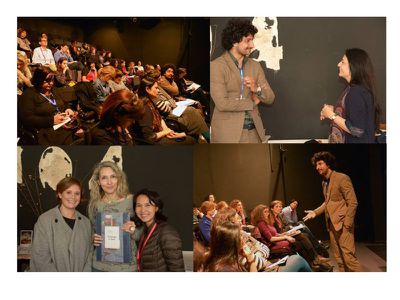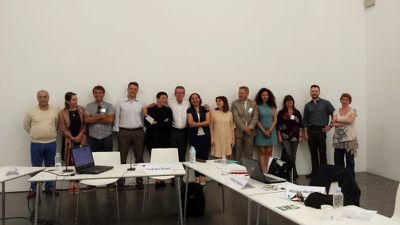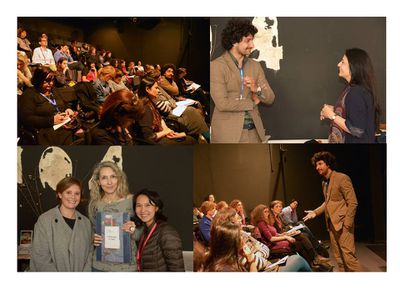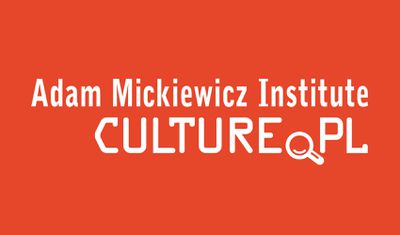By Herman Bashiron Mendolicchio
05 May 2014
Cultural mobility Series I : interview with Ferdinand Richard | Roberto Cimetta Fund
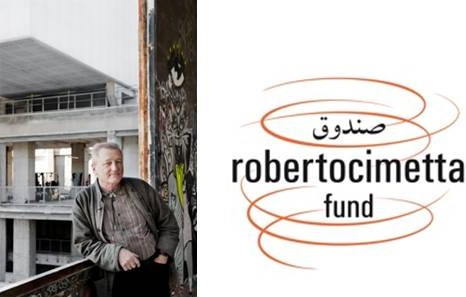
In 2014, culture360 invites a number of special correspondents to get an insight on issues that are highly discussed in the cultural sector across Asia and Europe.
Herman Bashiron Mendolicchio, will explore the concept of cultural mobility, focusing on the European region in particular. Through a number of in-depth articles and interviews, he will attempt to identify the concept of cultural mobility, its perception from the point of view of the funding bodies and the artists and practitioners who are seeking the funding. He will also look at how some countries such as Malta and Greece are integrating the concept of cultural mobility in their national cultural policies.
In this first article, Herman interviews Ferdinand Richard, Chairman of the Roberto Cimetta Fund, one of the most active organisations in advocating cultural mobility in the Mediterranean region.
[caption id="attachment_41301" align="aligncenter" width="466"]
Based in Paris, France, but working internationally, the Roberto Cimetta Fund (RCF) is extending its mission to provide mobility grants for artists and cultural practitioners – to accompanying artists in their long term international cooperation projects as well as advocating for mobility and freedom of movement worldwide.
Intercultural dialogue, cultural diversity, freedom of movement, cultural cooperation, etc., are just some of the keywords that identify the new narrative for mobility of the RCF. Mainly focused on the relationships between European and Arab countries, RCF is now widening its horizons and partnerships and it’s analysing the current challenges of cultural mobility in a broader sense.
Thanks to the help of Angie Cotte, Secretary General, and to the answers of Ferdinand Richard, Chairman of the Fund, we can get more information about RCF and get to know its visions, strategies and ideas.
Could you please introduce the RCF, its history, mission and background? Who was Roberto Cimetta and how did it start the activities of the Fund?
The RCF was founded in 1998, a few years after the Barcelona agreements (1995) acknowledged officially all the cultural dimensions of the Mediterranean-partnership, in order to foster exchanges and mobility between European and Mediterranean artists. Its mission was to answer the rising demand of artists’ mobility. Its process was rather simple and clear (distributing travel grants), which made it successful. The RCF is named in memory of the well-known and respected theatre and festival director, Roberto Cimetta, whose career ended far too early. He initiated projects that contributed deeply to the development of the international theatre community: the Inteatro Festival in Polverigi, Italy; IETM (Informal European Theatre Meeting); ACARTE, the contemporary performing arts programme of the Gulbenkian Foundation in Portugal. The name was suggested by his professional colleagues who mourned his premature death.
The main geographical focus of RCF is the Mediterranean. What does the Mediterranean mean for RCF?
This is no longer correct. This geographical focus changed over times, and for some years now, the RCF is integrating a larger area which consists in a dialogue between the Arab World (including the Gulf countries, Mauritania, Sudan, etc...) and all European countries. This has been changed due to the analysis that the geographical perspective for an Arab artist/operator cannot be restricted to the Mediterranean space, but must include the whole of the Arab cultural area. The future of a young Moroccan choreographer is to be seen also on the Gulf banks, and not only in Europe or on the Mediterranean coasts. As a side effect, this consideration is also stressing the fact that the concept of a Mediterranean space is maybe more of a European vision than an Arab one.
[caption id="attachment_41278" align="aligncenter" width="300"]
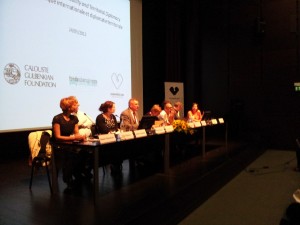 Guimarães (Portugal), 2012[/caption]
Guimarães (Portugal), 2012[/caption]The development of the artistic and cultural mobility is one of the primary goals of RCF. Could you tell me what is your concept and vision regarding cultural mobility?
The RCF experiments over the years showed that in fact mobility as such is not a goal. The real objective is that art communities wherever they are should gain financial autonomy, therefore freedom of expression, local cultural/artistic development, and should reach a "fair trade" situation between the north and the south in terms of cultural exchanges. And this cannot be achieved without this precious tool which is mobility. The RCF should be regarded as a development tool, not as a travel agency.
In terms of advocacy and networking, which is your strategy and what kind of international collaborations are you currently developing?
Important changes have occurred in the past 20 years, which have also impacted the way RCF is advocating and networking. For many decades, international cultural relationships have been mostly monitored at the national level (Ministries of Foreign Affairs and their agencies). But many local authorities were already having their own international partnerships, including the cultural field. At a time when national cultural agencies saw the decrease of their budgets, addressing local authorities seemed more and more obvious. It is a risky position (and the RCF had this harsh experience!) to expect funding for international cultural mobility from the sole national levels or European levels. Today, the fundraising scheme must be a mix of public national and local levels (including ECoCs [European Capitals of Culture]), private foundations, etc... Therefore, addressing these very different types of financing requires also different types of funding lines which will respond to each particular funder’s requirements. It must be also understood that a funding process is an exchange, and it is an important part of the funding relation to understand that the funder requires in return some visibility/communication moments, and this is one of the reasons why RCF is always trying to propose such actions (such as seminars, platforms, conferences) to a potential funder, on topics of its interest. To a large extent, by their theoretical or political production, these meetings have also the interesting effect of "re-legitimatizing" the funding process.
[caption id="attachment_41279" align="aligncenter" width="300"]
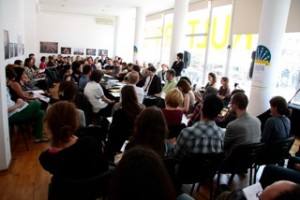 Belgrade Arab-Balkan exchange platform, 2013[/caption]
Belgrade Arab-Balkan exchange platform, 2013[/caption]As a mobility funder organization, could you tell me what, in your opinion, a proposal should address in order to get funding? How is your evaluation and selection process working?
Paradoxically, for the RCF, the most valuable part of a mobility process is the "return-phase". The added value of a trip can be measured when the beneficiary gets back home, and the way she/he shares the benefit of her/his trip with her/his community (benefit in terms of new ideas, new vision of her/his local community, new partners, new knowledge). We try to evaluate as much as possible the chances for this feedback to have a long-lasting cultural/artistic development effect, and a networking implementation. It is about an individual adventure which is impacting a collective interest. We aim also for our action to be ethically sound; we have an ethical charter that our experts, Board members, staff and grantees must adhere to and we also implement transparency, accountability, accessibility and efficiency as the four key elements that guarantee the quality and professionalism of our scheme.
We do live in times of instability in terms of public funding. What is your funding strategy? How do you convince and encourage municipalities and public institutions to support cultural mobility and the RCF projects?
The best angle to convince public authorities to invest in cultural/artistic mobility/exchanges is the creative factor. Most public authorities in the world are today convinced that they must be seen as a creative source, that their ability to support or attract creative forces is one of their key-issues in term of development and job-creations. They cannot match this image if their creative people do not circulate, or leave the country. They have to organise both the "export" of their creative image and make their countries attractive enough for the creative people to stay. The idea is to facilitate ‘round-trip’ mobility, not to suffer brain-drain effects. Several international/European treaties (The Lisbon Treaty for example) reinforce the necessity for local authorities to be seen as creative, attractive, and they cannot achieve this without a lively and internationally recognized creative sector. Mobility is a key-tool in this respect and it should be considered key to the development of capacity building. An important part of our funding strategy is to analyse the impact of mobility so that funders can appreciate the “return on investment” which is sometimes not evident in mobility funding. We have already produced two impact assessments and are working on an additional one this year.
Going beyond the Euro-Mediterranean region. We are now experiencing the development of several cooperation programmes that include, among others, Gulf and Asian countries. What are the geographical limits or ambitions of RCF?
As I said before, the context has changed. Instead of organising closed internal "domestic" relationship between Europeans and Arabs, it seems to me on a medium term (or maybe a shorter term than we thought!) that the intention should be more to create, from such a long tradition of shared cultural elements, a strong Euro-Arab creative platform which could address the rest of the world. It is in this prospect that creating links between the Euro-Arab platform and Asia (or other places in the World) must be seen as a new step for cultural relationship between these parts of the World. For example, it would make more sense and it would be much more flexible and efficient to organise a multi-lateral and simultaneous creative relationship between an Arab artist, a European producer and their counterparts in Asia, than referring (as it used to be) for each of them to their national cultural agencies in order to gain national support, with the possibility of success or failure, depending on the individual request. The RCF could be a funding instrument to respond to this need in the internationalisation of artistic practice.
[caption id="attachment_41280" align="aligncenter" width="300"]
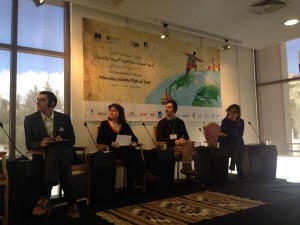 Advocating Mobility. Right on Track. Istikshaf Symposium. Amman, 2014[/caption]
Advocating Mobility. Right on Track. Istikshaf Symposium. Amman, 2014[/caption]The establishment of networks is one of the central activities in present times. An important project in which you are involved is the “Istikshaf Coalition”. Could you tell me more about this project?
The Istikshaf Coalition started in 2010 as an initiative to bring together organisations that were working on mobility in the Arab region, in order to explore mobility in it’s widest sense; not only as a cultural cooperation model but also as a cultural right to freedom of movement intrinsically related to the plight of generations of migrants and refugees. Over the years and after meetings in Amman, Alexandria, Aswan, Lille, Brussels, the Istikshaf Coalition has grown to encompass some 300 organisations that advocate for mobility. The Coalition wants mobility to be considered as a cultural policy at national levels that requires funding. It also aims to give back mobility to the Arab people as an essential part of their cultural life and a tool for learning and understanding different cultures.
Another important area, with a growing cultural context, are the Balkans. What kind of projects are you developing in the Balkan region?
Balkans and the Arab world have a long history (sometimes very tragic) of cultural relationship. At the time when Yugoslavia was one of the leaders of the non-aligned countries, there were many Arab artists studying in the Balkans, and many Balkan citizens operating in cultural relationship with the Arab world. In terms of development, the religious differences were not seen as antagonistic. The Yugoslavian War has destroyed this bridge too, but many of these people are still alive and working. Re-building cultural exchanges with the Arab World is a way to countering the wave of xenophobia which is hitting Europe today.
Talking about obstacles in mobility, what is your vision in relation to Visa issues? Do you have any plan or strategy in order to improve the visa procedures for artists and cultural operators?
Oddly enough, the RCF understands that this issue is very important, but it cannot develop a lot of arguments about it, for the simple reason that cases where RCF beneficiaries have had visa problems are quite rare. It seems that by benefiting from an RCF travel grant, the visa applicant is more successful in obtaining his or her visa, because the consulates know that the applicant will return to his or her home country to receive the reimbursement of travel expenses. It must be said that extremely rarely have we directly addressed consulates to obtain visas for our beneficiaries. We participated in several meetings on this specific issue, whether they were organised by the European Commission or by artists’ unions. Beyond some very painful cases, numbers should be looked at very carefully, since it seems that the global European situation of visas for extra-European artists or cultural operators has improved; but I would like also to avoid disconnecting this question with the issue of good-or-bad practices of the European "importers" of foreign artists. Every now-and-then, since decades, there are some cases of extra-European artists (they could be African musicians on tour in Europe, or south-American visual artists exhibited in rich European art galleries) unacceptably treated by their so-called European managers, and to my mind such attitudes cannot be disconnected from the sole visa issue. We need to have a global logic on all this field of the "relation to the other", and the visa issue is only one part of it.
Which are the most important results and outcomes that RCF has achieved?
Contributing to giving back their dignity to artists who are not in a proper situation to do this. Contributing to local communities and Cultural Diversity, in the sense of respecting all cultures around common cultural values.
After many years working in the international cultural and artistic field, what is your current perception of the cultural policies in the Euro-Med region? Are we progressing somewhere?
Interesting question, but I would not ask it this way. Since millenaries, the Cultural richness of the Euro-Arab zone is in a permanent evolution. It is not produced by cultural policies. To my opinion, good practices in cultural policies are supposed to dispatch correctly the share of the benefits that this permanent evolution produces, and not supposed to be instrumentalized for the sake of national prestige or cultural goods market shares. They are also supposed to guarantee the respect of Cultural rights for any individual, as it is written in art.1 of the Universal Declaration of the Human Rights. But cultural policies in the Euro-Arab zone are also very diverse, and sometimes strongly antagonistic, if not inexistent. It is of utmost importance that some permanent dialogue can be processed between the producers of these policies, who, as much as artists or private cultural activists, need to move in order to meet each other and negotiate.
Furthermore, considering the causes of the current conflicts in this area, it occurs to me that no sustainable solution can be achieved without a proper understanding and respect of each other’s culture. Mobility is at the heart of this expectation.
Relevant links:
http://www.cimettafund.org/index/index/lang/en
http://eeas.europa.eu/euromed/barcelona_en.htm
http://www.cimettafund.org/article/index/rubrique/1/lang/en/id/3
Herman Bashiron Mendolicchio holds a European PhD in “Art History, Theory and Criticism” from the University of Barcelona. His current lines of investigation involve the subjects of intercultural processes, globalization and mobility in contemporary art and cultural policies, the interactions between artistic, educational, media and cultural practices in the Mediterranean and the cultural cooperation between Asia and Europe. He has participated in several international conferences and developed projects and research residencies in Europe, Asia and the Middle East. As an art critic and independent curator he writes extensively for several international magazines. He is special correspondent for ASEF's portal www.culture360.asef.org.
Similar content
posted on
11 May 2015
posted on
25 Jul 2014
posted on
19 Mar 2015
posted on
02 Jun 2015
posted on
03 Jul 2013
posted on
06 Nov 2013
